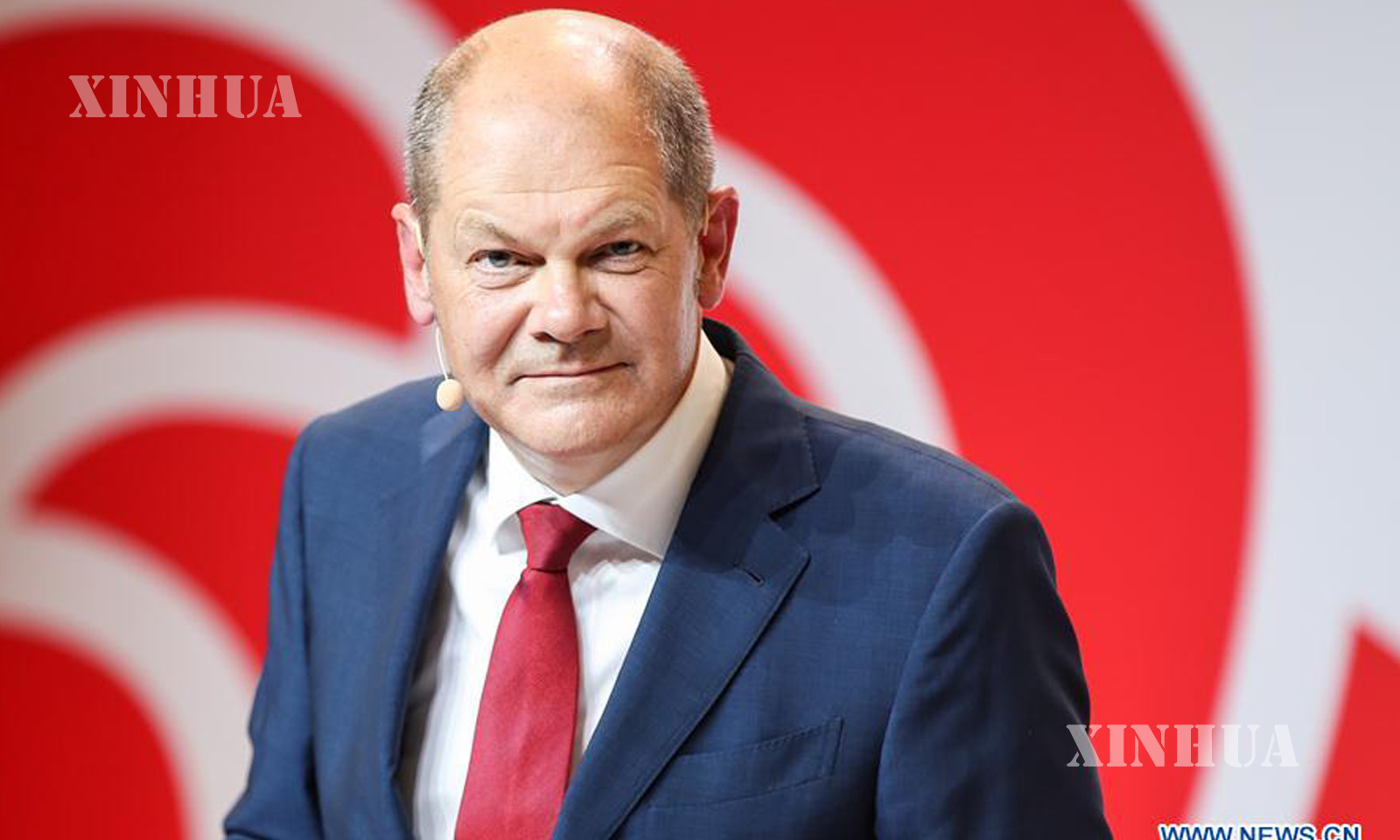Europe
ကနဦးမဲရလဒ်အရ ဂျာမနီ ဖက်ဒရယ်ရွေးကောက်ပွဲတွင် လက်ရှိ ဒုဝန်ကြီးချုပ် ဦးဆောင်သော SPD ပါတီ ဦးဆောင်နေ

ဘာလင် ၊ စက်တင်ဘာ ၂၇ ရက်(ဆင်ဟွာ)
ဂျာမနီနိုင်ငံ၏ လက်ရှိဒုတိယဝန်ကြီးချုပ် နှင့် ဘဏ္ဍာရေးဝန်ကြီး Olaf Scholz ဦးဆောင်သော ဗဟိုလက်ဝဲယိမ်း ဆိုရှယ် ဒီမိုကရက်တစ်ပါတီ (SPD)သည် တနင်္ဂနွေနေ့က ကျင်းပပြုလုပ်သော ဖက်ဒရယ်ရွေးကောက်ပွဲတွင် ထောက်ခံမဲ ၂၆ ရာခိုင်နှုန်းဖြင့် အနိုင်ရခဲ့ကြောင်း ကနဦးမဲရလဒ်ထုတ်ပြန်ချက်ကို ကိုးကား၍ ဂျာမနီ ZDF သတင်း ဌာနက ဖော်ပြခဲ့သည်။
ရှေးရိုးစွဲ ခရစ်ယာန်ဒီမိုကရက်တစ်ယူနီယံပါတီ(CDU) နှင့် ၎င်း၏မိတ်ဖက်ပါတီဖြစ်သည့် ဝန်ကြီးချုပ်လောင်း Armin Laschet ဦးဆောင်သော ခရစ်ယာန်ဆိုရှယ်ယူနီယံပါတီ(CSU)က ထောက်ခံမဲ ၂၄ ရာခိုင်နှုန်း ရရှိထားကြောင်း ကနဦးမဲရလဒ်အရ သိရသည်။
ထို့ကြောင့် ကနဦးမဲရလဒ်အရ Bundestag ဖက်ဒရယ် လွှတ်တော်ရွေးကောက်ပွဲတွင် CDU/CSU ပါတီ၏ လွှမ်းမိုးမှု အားသာချက်မှာ အဆုံးသတ်သွားခဲ့ရသည်။
Green ပါတီက ရွေးကောက်ပွဲတွင် ထောက်ခံမဲ ၁၄.၅ ရာခိုင်နှုန်းဖြင့် လွှတ်တော်တွင် အမတ်နေရာ တတိယအများဆုံး အနိုင်ရသည့် ပါတီဖြစ်လာပြီး ယင်းနောက်တွင် စီးပွားရေး-ချစ်ကြည်ရေး ပါတီဖြစ်သော Free Democratic Party (FDP) ပါတီ က ထောက်ခံမဲ ၁၂ ရာခိုင်နှုန်း နှင့် လက်ယာယိမ်း Alternative for Germany (AfD) ပါတီက ထောက်ခံမဲ ၁၀ ရာခိုင်နှုန်းဖြင့် အသီးသီးရပ်တည်လျက်ရှိကြောင်း ဂျာမနီအမျိုးသားအသံလွှင့်ဌာန ZDF က ဖော်ပြခဲ့သည်။
ဥရောပသမဂ္ဂ၏ အထင်ကရနိုင်ငံဖြစ်သည့် ဂျာမနီနိုင်ငံ၏ ယခုတစ်ကြိမ်ရွေးကောက်ပွဲသည် ဆယ်စုနှစ်တစ်ခု ကာလအတွင်း အကြိတ်အနယ်ရှိသော အထွေထွေရွေးကောက်ပွဲတစ်ခုအဖြစ် မြင်တွေ့ခဲ့ရသည်။
ဂျာမနီနိုင်ငံ၏ သက်တော်ရှည်ဝန်ကြီးချုပ်ဖြစ်သည့် အိန်ဂျလာမာကဲလ်သည် ၎င်း၏ စတုတ္ထသက်တမ်းပြီးနောက်တွင် နောက်တစ်ကြိမ်ရွေးကောက်ပွဲ ထပ်မံ ဝင်ရောက်တော့မည်မဟုတ်ကြောင်း ၂၀၁၈ ခုနှစ်တွင် ပထမဆုံးအကြိမ် ထုတ်ဖော်ကြေညာခဲ့သည်။
၂၀၁၇ ခုနှစ်က နောက်ဆုံးကျင်းပခဲ့သည့် Bundestag လွှတ်တော်ရွေးကောက်ပွဲတွင် ထိုစဉ်က မာကဲလ်ဦးဆောင်သော ရှေးရိုးစွဲ CDU/CSU ပါတီသည် ထောက်ခံမဲ ၃၃ ရာခိုင်နှုန်းရရှိခဲ့ပြီး အဓိက ပြိုင်ဘက် SPD ပါတီမှာမူ ထောက်ခံမဲ ၂၀.၅ ရာခိုင်နှုန်းသာ ရရှိခဲ့သည်။
ယခုနှစ်ရွေးကောက်ပွဲတွင် ဂျာမနီနိုင်ငံ၌ မဲပေးခွင့်ရှိသူ ၆၀.၄ သန်းရှိပြီး နိုင်ငံတစ်ဝှမ်းရှိ မဲဆန္ဒနယ်ပေါင်း ၂၉၉ ခုအတွက် ယှဉ်ပြိုင်ခဲ့ရသည်။
တရားဝင် စစ်တမ်းများအရ တနင်္ဂနွေနေ့က ပြုလုပ်သော အထွေထွေရွေးကောက်ပွဲတွင် မွန်းလွဲ ၂ နာရီအထိ မဲရုံသို့ ကိုယ်တိုင် တိုက်ရိုက်ဆန္ဒမဲ လာရောက်ထည့်သူ ၃၆.၅ ရာခိုင်နှုန်းရှိခဲ့ရာ ၂၀၁၇ ခုနှစ် ရွေးကောက်ပွဲ ကာလတူက ရရှိခဲ့သော ၄၁.၁ ရာခိုင်နှုန်းထက် များစွာ လျော့နည်းကျဆင်းခဲ့ကြောင်း သိရသည်။
“ မျှော်လင့်ထားတဲ့အတိုင်းပါပဲ ဒီတစ်ကြိမ်ရွေးကောက်ပွဲမှာ ကိုယ်တိုင်ဆန္ဒမဲလာထည့်သူဟာ ၂၀၁၇ ခုနှစ်က ထက်လျော့နည်းပါတယ်။ ဘာကြောင့်လဲဆိုတော့ စာတိုက်ကတဆင့်မဲထည့်သူက ပိုများမယ်လို့ ကျနော်တို့ မျှော်လင့်လို့ပါ ၊ သူတို့ရဲ့မဲရလဒ်ကို ရွေးကောက်ပွဲရဲ့ အပြီးသတ်မဲရလဒ်ကြေညာချိန်မှာ ထည့်သွင်းတွက်ချက်ပေးသွားမှာပါ ” ဟု ဂျာမနီဖက်ဒရယ်စာရင်းအင်းရုံးအရာရှိ Georg Thiel ကဆိုသည်။ (Xinhua)
————————————
(English Version)
SPD leads in German federal election: preliminary exit poll
BERLIN, Sept. 26 (Xinhua) — Germany’s center-left Social Democratic Party (SPD) led by the incumbent Vice Chancellor and Finance Minister Olaf Scholz, won about 26 percent of the vote in the federal election on Sunday, according to the preliminary exit poll released by German media ZDF.
The conservative union of Christian Democratic Union (CDU) and its sister party Christian Social Union (CSU) led by the chancellor candidate Armin Laschet took about 24 percent of the vote, said the poll.
The preliminary results ended the dominant role of CDU/CSU in the country’s Bundestag, the federal parliament.
The Green Party received 14.5 percent of votes in the election, making it the third-largest political faction in parliament, followed by the business-friendly Free Democratic Party (FDP) and the far-right party Alternative for Germany (AfD) with 12 percent and 10 percent respectively, said national broadcaster ZDF.
Germany, the European Union’s (EU) most populous country, has hardly ever seen a nail-biting general election as this one in well over a decade.
Angela Merkel, Germany’s long-serving chancellor, first announced in 2018 that she would not run for re-election after her fourth term.
In the last Bundestag election of 2017, the conservative Union, CDU/CSU, which was led by Merkel at that time, secured 33 percent of the vote, while its main rival SPD took only 20.5 percent.
This year, around 60.4 million people are eligible to vote in Germany, and the country is divided into 299 electoral districts.
According to official statistics, voter turnout of Sunday’s general election directly in polling stations stood at 36.5 percent by 2 p.m. local time (1200 GMT), slightly lower than the 41.1 percent at the same time in 2017.
“The voter turnout now determined is lower than in 2017, as was expected, because we expect a markedly higher share of postal voters. Their voter turnout will be calculated later when determining the final election result,” said Federal Returning Officer Georg Thiel. Enditem
German Vice Chancellor and Finance Minister Olaf Scholz attends a press conference in Berlin, capital of Germany, Aug. 10, 2020.






